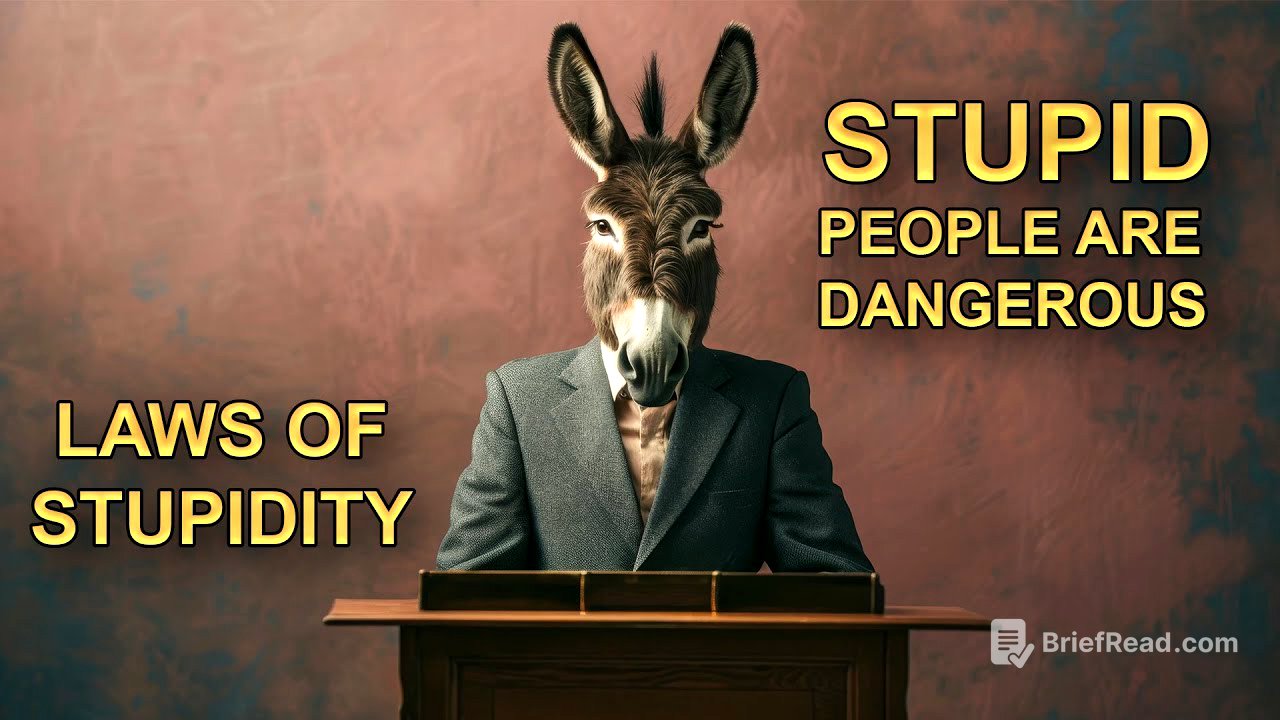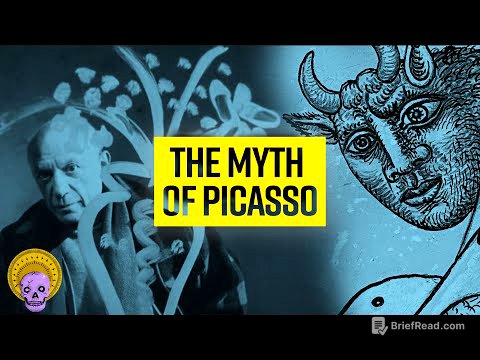TLDR;
This video summarizes Carlo Cipolla's essay, "The Basic Laws of Human Stupidity," exploring the definition, impact, and implications of stupidity. It outlines Cipolla's five basic laws, which include the underestimation of the number of stupid people, the independence of stupidity from other characteristics, the harm caused by stupid individuals, the underestimation of the power of stupid people, and the danger they pose. The video also addresses why we react so negatively to stupidity and how to protect ourselves and society from irrational decisions.
- Stupidity is defined beyond a lack of knowledge, having predictable causes and mathematical patterns.
- Stupid people harm others without benefiting themselves, making them more dangerous than bandits.
- Protecting society involves promoting critical thinking, emotional intelligence, and open dialogue.
What exactly is stupidity [0:00]
The video begins by posing the question of what exactly constitutes stupidity, distinguishing it from a mere lack of knowledge. It suggests that stupidity might be the most dangerous force in the world and explores what makes individuals prone to irrational decisions. The aim is to understand how to protect ourselves and society from the impacts of stupidity, potentially leading to a smarter and safer world.
The Basic Laws of Human Stupidity [0:39]
The video introduces Carlo Cipolla's essay, "The Basic Laws of Human Stupidity," initially a private joke that gained widespread recognition. Cipolla's theory suggests that stupidity has fundamental laws and predictable causes, independent of other characteristics. He argues that stupidity follows mathematical patterns, leading to decisions against common sense and self-interest. The potential harm a stupid person can cause is amplified by their power within society.
Cipolla's definition of stupidity [1:22]
Cipolla's definition of stupidity goes beyond a simple lack of knowledge or intelligence. He posits that stupidity has fundamental laws and predictable causes that are independent of other characteristics. According to Cipolla, human stupidity follows clear mathematical patterns, leading people to make decisions that defy common sense and self-interest.
Cipolla's experiment [2:05]
To explain his theory, Cipolla divided people into four behavioral groups: the helpless, the intelligent, the bandits, and the stupid. He considered how a person's behavior could benefit or harm themselves and others. People's awareness of the effects of their behavior can vary greatly.
Conclusion [2:48]
Intelligent people contribute positively to society, creating mutual benefits, while stupid people cause a net loss for both themselves and society. Bandits pursue their own interests at the expense of society, and the helpless, though contributing positively, are easily exploited. Cipolla concludes that the stupid person is the most dangerous type, even more so than organized crime or political ideologies.
5 Basic Laws of Human Stupidity [3:55]
The video details Cipolla's five basic laws of human stupidity:
- Underestimation of Stupid Individuals: Everyone underestimates the number of stupid people.
- Independence from Characteristics: The probability of someone being stupid is independent of any other characteristic like education, wealth, or status.
- Harm Without Benefit: A stupid person causes harm to others without any benefit to themselves, potentially even suffering losses.
- Underestimating Damaging Power: Non-stupid people underestimate the damaging power of stupid people and the cost of associating with them.
- Most Dangerous Person: A stupid person is the most dangerous type of person, even more so than a bandit, due to their unpredictability.
Why do we hate stupid people so much? [7:52]
Interactions with stupid people and their effects on groups activate the insula, a brain region associated with disgust. This reaction is similar to the disgust experienced with spoiled food or poor hygiene, indicating that stupidity is perceived as a significant threat, triggering a protective response.
What makes people susceptible to irrational decisions and how can we protect ourselves and our society from them? [9:18]
To protect against irrational decisions, the video emphasizes the importance of promoting critical thinking through education, balanced media, emotional intelligence, and open dialogue. Strengthening analytical skills, managing emotions, and respecting diverse opinions can collectively reduce the risk of irrational decisions and strengthen societal wisdom.









